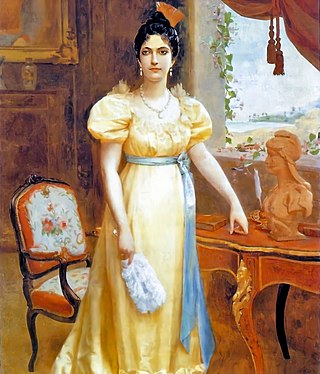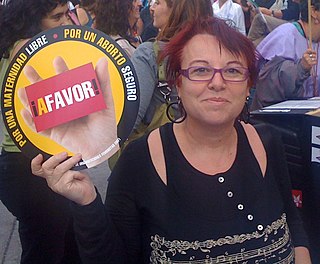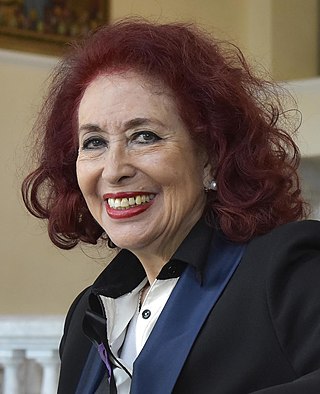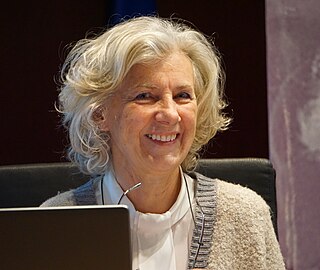
Lesbian, gay, bisexual, transgender, and queer (LGBTQ) rights in Uruguay rank among the highest in the world. Same-sex sexual activity has been legal with an equal age of consent since 1934. Anti-discrimination laws protecting LGBT people have been in place since 2004. Civil unions for same-sex couples have been allowed since 2008 and same-sex marriages since 2013, in accordance with the nation's same-sex marriage law passed in early 2013. Additionally, same-sex couples have been allowed to jointly adopt since 2009 and gays, lesbians and bisexuals are allowed to serve openly in the military. Finally, in 2018, a new law guaranteed the human rights of the trans population.

Gender equality is established in the constitution of Venezuela and the country is a signatory of the United Nations's Convention on the Elimination of All Forms of Discrimination Against Women. However, women in the history of Venezuela have played asymmetrical roles in society compared to men. Notable women have participated in the political history since the Venezuelan War of Independence in the 19th century, but universal suffrage was not granted until 1947.
Magaly Antonia Pineda Tejada, known as the mother of feminism in the Dominican Republic, was a Dominican sociologist, teacher, researcher, and activist. She was considered one of the most important defenders of human rights, particularly women's rights, in her country. As a leftist activist, she participated in the 14th of June Revolutionary Movement and the Dominican Popular Movement.

Cándida Martínez López is a Spanish historian, university professor, expert in women's history and studies, and politician. From 2000 to 2008 she was Councilor of Education of the Regional Government of Andalusia, and from 2008 to 2011 a deputy of the 9th Legislature of Spain. She is co-director of Arenal, Journal of Women's History.

Montserrat Boix Piqué is a Spanish journalist, considered among the most influential women in her country. In early 2000, she created and developed the concepts of social cyberfeminism, and a year later those of feminist hacktivism. Another of her main areas of work is gender violence and communication. She has also stood out as a defender of the right to communication and citizenship rights for women. Since 1986, she has been a journalist for the Information Services of Televisión Española (TVE), in the international section.

Laura Nuño Gómez is a Spanish political scientist, researcher, and feminist activist. She is director of the Gender Studies Chair of the Institute of Public Law and the Gender Equality Observatory at King Juan Carlos University (URJC), as well as the creator of the first academic degree in Gender Studies in Spain, and of various postgraduate programs in this subject. She is the author of El mito del varón sustentador, as well as about 30 articles and books about her research. Since the enactment of the Law for Effective Equality of Women and Men, she has been one of the three expert members of the State Council for the Participation of Women.
M. Cristina Alcalde is Vice President for Institutional Diversity and Inclusion at Miami University. Previously, she served as Marie Rich Endowed Professor of Women's and Gender Studies at the University of Kentucky, where she was also Associate Dean of Inclusion and Internationalization in the College of Arts and Sciences at the university. There, she was also an affiliate faculty member in the Social Theory, Latin American, Caribbean, and Latino Studies, and Anthropology departments and worked with the Center for Research on Violence Against Women. Her research focuses on exclusion, leadership, gender violence, migration, and race and racialization.
Margarita M. Birriel Salcedo is a tenured professor in the Department of Modern and American History at the Faculty of Philosophy and Letters of the University of Granada. She is an expert in women's history and women's studies.

Lidia Falcón O'Neill is a Spanish politician and writer. With a degree in law, dramatic art, and journalism, and a PhD in philosophy, she has stood out for her defense of feminism in Spain, especially during the Transition.

Fourth-wave feminism in Spain is about digital participation in virtual spaces, encouraging debates and using collective force to enact change. It is about fighting patriarchal systems, denouncing violence against women, and discrimination and inequality faced by women. It is also about creating real and effective equality between women and men. It has several major themes, with the first and most important in a Spanish context being violence against women. Other themes include the abolition of prostitution, the condemnation of pornography, the support of legal abortion, the amplifying of women's voices, ensuring mothers and fathers both have access to parental leave, opposition to surrogacy, and wage and economic parity.
Alejandra Mora Mora is a Costa Rican jurist, lawyer, professor, and politician. She has been a human rights activist, especially in the area of women's rights. She served as her country's Minister of Women's Affairs from 2014 to 2018, was president of the National Institute for Woman (INAMU), and director of the women's section of the Ombudsman's Office of Costa Rica.

The Ministry of Women, Genders and Diversity was a ministry of the Argentine Government tasked with overseeing the country's public policies on issues affecting women and gender and sexual minorities. The ministry was created in 2019, as one of the initial measures of President Alberto Fernández; the first minister was Elizabeth Gómez Alcorta.

Elizabeth Gómez Alcorta is an Argentine lawyer, professor and politician. She was the first Minister of Women, Genders and Diversity of Argentina, serving under President Alberto Fernández from 10 December 2019 to 7 October 2022.

Barbara Zecchi is a feminist film scholar, film critic, videoessayist, and film festival curator. She is professor of Film Studies and director of the Interdepartmental Program in Film Studies at the University of Massachusetts Amherst.
The 2020 COVID-19 pandemic in Argentina affected the human rights situation in the country.
Magdalena León is a Colombian feminist sociologist specializing in social research and women's studies. Trained with the founders of Colombian sociology, Orlando Fals Borda and Camilo Torres Restrepo, she transferred the rhetorical and discursive framework to the analysis of empirical reality using the survey, systematization, and data analysis to learn the reality on the ground, not only of Colombia but also from Latin America.

Florence Thomas is a French-Colombian social psychologist and feminist academic. She was a co-founder of the Programa de Estudios de Género, Mujer y Desarrollo at the National University of Colombia. She is also a journalist for the newspaper El Tiempo. Thomas was honored with the Premio Nacional de Periodismo Simón Bolívar in 2005. In 2017, Thomas was decorated as a Knight in France's Legion of Honour.

Audencio “Leckott” Zamora is a writer, musician, journalist, cultural model and artisan of the Wichí people. He lived many years in Venezuela and currently resides in Puerto Tirol, Chaco Province. He has written several books about Wichí culture, and helped in several newspaper and scientific articles related to the rights, health and education of indigenous peoples.

Teresa Meana Suárez is a Spanish feminist activist, teacher, and philologist specializing in inclusive and non-sexist language. She has published numerous articles on the issue of language discrimination against women, specifically, in Spanish.

Mercedes Bengoechea Bartolomé is a Spanish feminist sociolinguist, professor of English philology and a proponent for the defense of the use of gender-neutral language from an academic foundation. She has had a long career as an advisor to various entities, including the Institute of Women and the Instituto RTVE (IORTV). Since 1994, Bengoechea has been a member of the Comisión Asesora sobre Lenguaje del Instituto de la Mujer (NOMBRA). She has been vocal at the Commission for the Modernization of Legal Language of the Ministry of Justice, as well as coordinator of the first Annual Report of the National Observatory on Gender Violence. She defends the need to implement a non-sexist use of language, in the face of resistance from institutions such as the Royal Spanish Academy (RAE). She has received various awards for her research and innovative work within her specialty.














